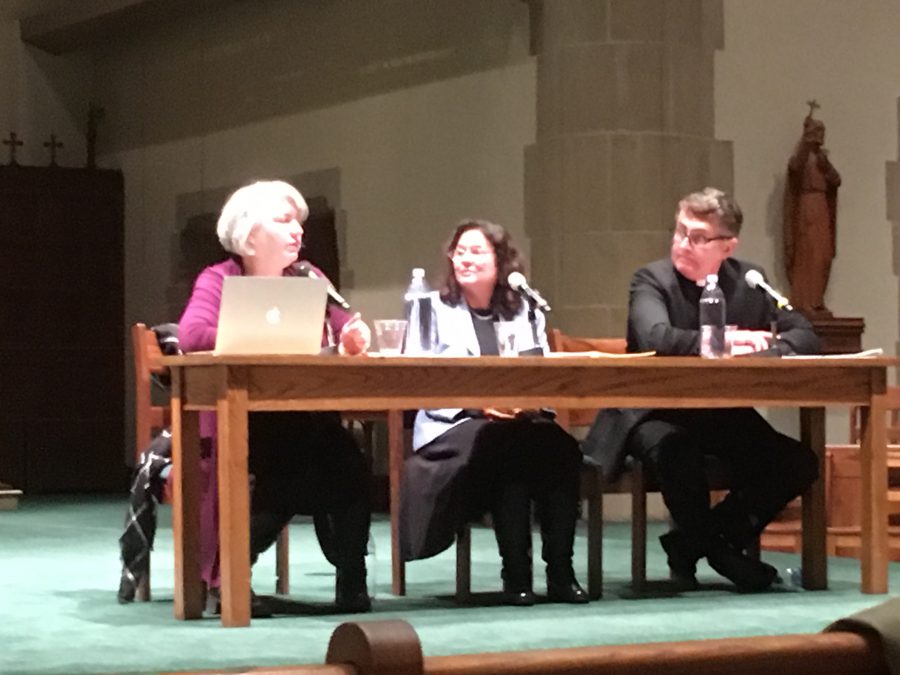On Wednesday, Nov. 14, members of the Loyola community gathered in the Alumni Memorial Chapel to have a panel discussion regarding the sexual abuse crisis in the Catholic Church.
The event titled “The Sex Abuse Catastrophe in the Catholic Church: Seeking a Way Forward” was hosted by Loyola theology professors Frederick Bauerschmidt, Ph.D., and Angela Russell Christman, Ph.D.
The panel consisted of three speakers including Loyola President Father Brian Linnane, S.J., Ph.D., Los Angeles-area psychologist Nanette de Fuentes, Ph.D., and Providence College theology professor Holly Taylor Coolman, Ph.D.
Each panelist gave their perspective on the sexual abuse scandals that have affected the Catholic Church in recent years and then answered questions from the audience.
In Linnane’s remarks, he addressed the church’s obligation to deal directly with the sexual abuse problem.
“The responsibility of the authorities is to root that out and deal with it, not cover it up or be afraid that it will reflect badly on the institution,” Linnane said.
He also discussed the increased measures that the church has taken to prevent future abuse, such as training sessions for priests about sexual abuse issues. He talked about the improved systems of documentation for priests, including fingerprinting and increased background checks.
“I would suggest that there is probably no safer place for a child than in a Roman Catholic institution today,” Linnane said.
De Fuentes brought her knowledge as a psychologist to the discussion, as well as her personal experience as a survivor of clergy sexual abuse.
“I did not understand the boundary issues, and I did not understand how vulnerable I was,” de Fuentes said when reflecting on her abuse. In her particular experience, de Fuentes was involved in a relationship with a non-catholic religious leader who took advantage of her.
In her profession, de Fuentes has worked on clergy oversight boards and has developed programs on boundary violations and preventing clergy abuse. “This work has helped me very much in my own recovery,” she said.
In sexual abuse scandals like the recent controversy in Pennsylvania cities such as Pittsburgh and Allentown, investigations found bishops and other Catholic Church leaders covering up large amounts of sexual abuse. De Fuentes clarified that while many leaders in past church sex scandals had covered up abuse, there were some bishops who were taking the right action by reporting instances of abuse.
“Not all church leaders failed to deal with clergy sex abuse. Some bishops were innovators in this area,” de Fuentes said. In these specific cases, de Fuentes asserted that it was not the church leaders who protected abusers. “Laity were part of the problem. Many laity groups refused to believe credible allegations brought against abusive clergy,” she said.
Coolman talked about responses to sexual abuse scandals in the church and how many people turn to anger in these situations. She discussed how in Christian theology, anger is often viewed as the incorrect response. However, it can be appropriate when seeking justice for people who have been harmed.
“When we seek justice for offenses against others, such anger is warranted,” Coolman said.
In order to channel this anger into constructive activities, Coolman urged the audience to contact their bishops about their concerns. “The office of the bishop is the office of unity and connection. I believe it’s important that bishops in the United States know what it is that Catholics are thinking and feeling at this time,” she said.
While Linnane said that he would not be able to mandate special intentions for sexual abuse victims for all masses said in the Alumni Chapel, he believes that the Loyola community should be praying for the victims.
“We should be conscious of the brokenness of the victims and should be praying that steps are taken to support them and heal them,” Linnane said.



















































































































